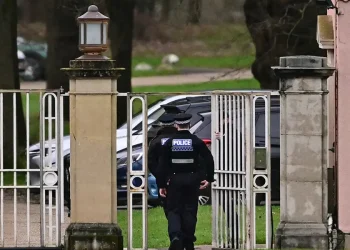COLUMBIA, S.C. (news agencies) — The appeals are just beginning for disgraced former South Carolina attorney Alex Murdaugh, who is almost three years into a life sentence without parole for killing his wife and son.
The South Carolina Supreme Court has agreed to hear Murdaugh’s appeal of his murder convictions. His lawyers said they resulted from jury tampering by the clerk of court who watched over jurors during his six-week trial.
And in federal court, Murdaugh is appealing the 40-year sentence he was given after pleading guilty to stealing nearly $11 million from clients and his law firm.
Defense attorneys said that punishment — 10 years longer than the maximum recommended by sentencing guidelines — is too harsh under the U.S. Constitution. Prosecutors said it is a backstop in case Murdaugh, now 56, ever manages to get his murder conviction overturned.
His appeals will continue for years. Courts haven’t even begun hearing the meat of Murdaugh’s argument that the judge in his murder trial made mistakes, for example by allowing his money thefts into evidence. That was critical to the prosecution’s argument that the killings were meant to buy sympathy and time to keep the thefts from being discovered.
The defense said that evidence unfairly made jurors angry, when all they were supposed to consider was the killings.
The state court appeal on jury tampering is fairly straightforward.
A lower court judge refused to toss out Murdaugh conviction after his lawyers argued that as Colleton County Clerk of Court, Becky Hill told jurors at his murder trial not to trust Murdaugh when he testified, had private discussions with the jury foreperson and pressured jurors to come to a quick verdict. Hill later resigned amid an ethics investigation.
Judge Jean Toal, a retired state Supreme Court Chief Justice assigned to this appeal, cited the standard set by a previous South Carolina high court ruling, that to overturn a verdict on jury tampering, there has to be a determination that a juror changed their mind as a result of the improper influence.
Murdaugh’s lawyers argued that instead, a federal judge’s ruling in an unrelated case should apply — that defendant must only prove the conduct had the potential to influence a juror.
The state Supreme Court’s one-paragraph order Tuesday accepting the appeal gave Murdaugh’s lawyers 30 days to file arguments, and set no date for a hearing.
In the federal case, Murdaugh’s lawyers said his right against cruel and unusual punishment under the U.S. Constitution was violated because Judge Richard Gergel ignored the 17 1/2 years to just under 22 years in prison recommended by federal agents and sentenced Murdaugh to 40 years.
The trial prosecutors had asked for 30 years, so that Murdaugh would be in prison for the rest of his life no matter what happened to his murder conviction.
In response to his appeal, federal prosecutors noted simply that when Murdaugh agreed to plead guilty, he signed a document saying he wouldn’t appeal unless prosecutors lied or his defense attorneys were inadequate.
Murdaugh stole from his clients in wrongful death and injury cases. In handing down the stiff sentence, Gergel said Murdaugh stole from “the most needy, vulnerable people,” including a client who became a quadriplegic after a crash, a state trooper who was injured on the job, and a trust fund intended for children whose parents were killed in a wreck.
And those people “placed all their problems and all their hopes” with their lawyer, Gergel said.
In arguing for a lighter sentence, Murdaugh’s attorneys compared his case to the 25 years in prison for crypto entrepreneur Sam Bankman-Fried or the 11-year sentence handed down to Theranos CEO Elizabeth Holmes, saying they stole billions while Murdaugh’s thefts were in millions.
But the victims in those cases were investors, whereas Murdaugh stole from vulnerable people who trusted him to protect their legal interests.
Murdaugh’s lawyers want the sentence overturned and a new judge to thoroughly review the case to decide if the 40-year sentence is fair.
Prosecutors said that has almost never happened in the U.S. They said the only relevant review they could find involved a life sentence for passing a $100 bad check.










 American Dollar Exchange Rate
American Dollar Exchange Rate